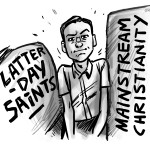One unique aspect of the Church of Jesus Christ of Latter-day Saints is that, among most if not all Christian branches, they do not have a paid clergy. Every leadership and priesthood position in the church is volunteer. This means all talks and teaching on any given Sunday Sacrament Service are provided by various members of the congregation. All members are spiritual family members with a lesson to share from their experiences during that week.
In honoring that tradition, I would like to introduce Sister Emily Geddes to share her testimony and wisdom regarding her experience with the Church of Jesus Christ of Latter-day Saints.
—-
Hello, Project Conversion Ward! I’m thrilled to have this opportunity to share some of my thoughts on my faith with you. By way of introduction, I’m a 33-year-old homeschooling, politically independent, feminist, stay-at-home, faithful Latter-day Saint mother of three wonderful boys. I love reading, writing, learning, and embracing truth wherever I find it. My best friend/love of my life and I have been married for just over twelve years now. I’ve gone skydiving, earned an MBA, interned at an electron beam accelerator facility, lived all over the U. S. of A. and, for a brief time, in Europe, and recently learned how to make pickles (it’s surprisingly easy!).
Latter-day Saint mother of three wonderful boys. I love reading, writing, learning, and embracing truth wherever I find it. My best friend/love of my life and I have been married for just over twelve years now. I’ve gone skydiving, earned an MBA, interned at an electron beam accelerator facility, lived all over the U. S. of A. and, for a brief time, in Europe, and recently learned how to make pickles (it’s surprisingly easy!).
I was born and raised in an active Latter-day Saint family. While my dad joined the Church in his early twenties, my mom is from a long line of pioneer stock – yes, some of her ancestors crossed the plains with Brigham Young. Coming from a strong background of any faith, it’s easy to take it for granted. At some point, however, everyone has to determine whether the path on which they were born is the path on which they should stay. I floated passively along this spiritual path of least resistance with a token rebellion here and there during my teenage years. Then, when I was 15, life-threatening injuries from a car accident left me with several physical scars and a terrifying realization that I did not know who I was or who I wanted to be. The faith I thought I had was completely inadequate to sustain me through this trial. During my recovery I decided it was time to find out for myself if what I had been taught at church and by my parents was really true. That was the beginning of spiritual discovery – simply making a choice to actively seek truth from the Source. My conversion wasn’t an instantaneous experience by any means; on the contrary it’s a process that continues to this day.
One aspect of the gospel of Jesus Christ that consistently grounds me is that we are literal children of God. We have a Heavenly Father and a Heavenly Mother who love us and want us to be happy and to learn and grow and fulfill our potential. And because we are all children of these perfect, omnipotent Parents, our potential is unlimited! As I’ve experienced parenthood, my appreciation of this principle has deepened immeasurably. The overwhelming love I feel for my children gives me a taste of the love my Heavenly Parents must feel for each of their children. I watch my boys as they grow and struggle and make mistakes and learn by experience and understand a little better why our Heavenly Parents sent us here and what They want for me during our time apart.
We believe in eternal progression; that we learn “line upon line, precept upon precept;” and that God isn’t done revealing truth to the world. I love that our faith has a tradition (starting in modern times with Joseph Smith) of asking questions and getting personal answers. We have both the right and the responsibility to communicate directly with God and receive personal, individual direction for our lives. The answer isn’t always what we expect, and sometimes doesn’t come exactly when we want it, but it comes.
Challenges, of course, come frequently. Applying the teachings of Christ in every interaction with others is a tall order, and I fall short every day. Reconciling beliefs that I hold dear, but at first seem contradictory (please note, for example, the descriptors “feminist” and “faithful Latter-day Saint” in my first paragraph) is a struggle that I often work through on my knees in prayer. But since I believe that the Gospel encompasses all truth, and that God hears and answers my sincere questions, I believe that reconciliation is possible. So I keep praying and working to understand what I don’t yet grasp.
Most of my challenges with my faith community are more a result of the culture than the doctrine. And let me be very clear: there is a difference between the two! It irks me to no end when cultural conformity is equated with righteousness. There are those who seem disproportionately concerned with what I consider trivialities or peripherals, or who insist that their interpretation of doctrine or scripture is the only possible “right” one. But every faith has its zealots and I’m trying to be more loving and patient when I run into them in my own. Thankfully, I’ve found that they are not the majority.
As Elder M. Russell Ballard, one of the Twelve Apostles, said in the last General Conference, “the gospel of Jesus Christ is simple, no matter how much we try to make it complicated.” Over and over, it boils down to Love: the love our Heavenly Parents and our Savior have for us, the love we should have for each other and for Them. Another Apostle, President Dieter F. Uchtdorf, reminded us recently, “Because love is the great commandment, it ought to be at the center of all and everything we do in our own family, in our Church callings, and in our livelihood.” I believe in the Gospel of Jesus Christ as taught by The Church of Jesus Christ of Latter-day Saints because it calls me to love and serve others, to question and struggle and study and find answers, and to eventually return to my Heavenly Parents, continuing to progress with my loved ones forever.
—–
Thank you Sister Geddes! I hope you’ve enjoyed her testimony and that you will consider sharing your own thoughts here via comments or on the Project Conversion Facebook page.

